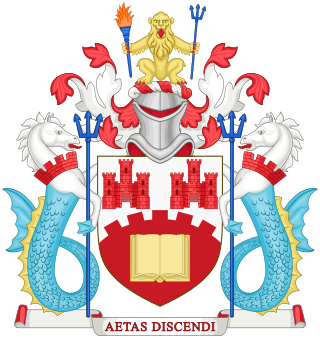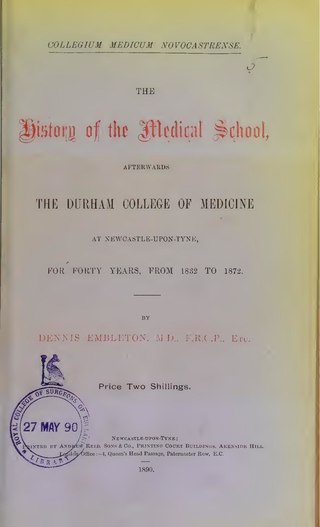
Newcastle University is a public research university based in Newcastle upon Tyne, North East England. It has overseas campuses in Singapore and Malaysia. The university is a red brick university and a member of the Russell Group, an association of research-intensive UK universities.
Truancy is any intentional, unjustified, unauthorized, or illegal absence from compulsory education. It is a deliberate absence by a student's own free will and usually does not refer to legitimate excused absences, such as ones related to medical conditions. Truancy is usually explicitly defined in the school's handbook of policies and procedures. Attending school but not going to class is called internal truancy. Some children whose parents claim to homeschool have also been found truant in the United States.

Northumbria University is a public research university located in Newcastle upon Tyne, North East of England. It has been a university since 1992, but has its origins in the Rutherford College, founded in 1877.

The specialist schools programme (SSP), first launched as the Technology Colleges programme and also known as the specialist schools initiative, specialist schools policy and specialist schools scheme, was a government programme in the United Kingdom which encouraged state schools in England and Northern Ireland to raise private sponsorship in order to become specialist schools – schools that specialise in certain areas of the curriculum – to boost achievement, cooperation and diversity in the school system. First introduced in 1993 to England as a policy of John Major's Conservative government, it was relaunched in 1997 as a flagship policy of the New Labour governments, expanding significantly under Prime Minister Tony Blair and his successor Gordon Brown. The programme was introduced to Northern Ireland in 2006, lasting until April 2011 in England and August 2011 in Northern Ireland. By this time, it had established a near-universal specialist system of secondary education in England, with almost every state-funded secondary school in England having specialised. This system replaced the comprehensive system which had been in place since the 1970s.

The Halley Academy is a secondary school and sixth form with academy status located on Corelli Road and near the Kidbrooke area of the Royal Borough of Greenwich in southeast London. It originally opened in 1954 as Kidbrooke Comprehensive School for Girls and was one of Britain's first purpose-built comprehensive schools. It started admitting boys in 1982. It changed its name to Corelli College in September 2011 when it became an Academy. It adopted its current name in March 2018, when it joined the Leigh Academies Trust.

Blakelaw is an electoral ward situated in the West End of the city of Newcastle upon Tyne in North East England. The population of the ward is 11,186, which is 4.6% of the city's population. Car ownership in the area is 50.6%: this is lower than the city average of 54.7%, increasing to 11,507 at the 2011 Census. House prices in this area average at £114,000.

Newcastle University School of Medicine is the medical school at Newcastle University in England. It was established in 1834 in the city of Newcastle upon Tyne and served as the College of Medicine in connection with Durham University from 1851 to 1870 and then, as a full college of the university, Durham University College of Medicine from 1870 to 1937 when it joined Armstrong College, to form King's College, Durham. In 1963 King's College became the University of Newcastle upon Tyne. The university now uses the name "Newcastle University".
SSAT Limited is a UK-based, independent educational membership organisation working with primary, secondary, special and free schools, academies and UTCs. It provides support and training in four main areas: teaching and learning, curriculum, networking, and leadership development.

Jesmond Park Academy is a coeducational secondary school and sixth form located in Heaton, Newcastle upon Tyne, England.

Kenton School is an Academy located in Newcastle upon Tyne, in Tyne and Wear, England. It is near Kenton Lane in Kenton and provides education for students in Key Stage 3 – 5, specifically Years 7 – 11.

ThePriory City of Lincoln Academy is a co-educational secondary academy and sixth form in Lincoln, Lincolnshire, England. It is a member of The Priory Federation of Academies and leads the government's School Games Organiser programme. It is also a specialist school in sports and health, exercising a partially selective intake in the former.

Burnt Mill Academy is a secondary school academy and specialist performing arts college situated on First Avenue in Harlow, Essex, England. The school originally opened in May 1962 as Burnt Mill Comprehensive School, de jure keeping this name until academisation in 2011. In 2003, it became a specialist performing arts college, specialising in dance, drama and music. It joined the Confucius institute programme in 2007, partnering with Suzhou Lida Middle School in Jiangsu, China. This granted the school an International School Award. It gained academy status in 2011 and formed the Burnt Mill Academy Trust (BMAT) in 2013. BMAT has since become a multi-academy trust, with 12 member schools as of 2021.
Jarrow School is a coeducational secondary school located in Jarrow, South Tyneside, England admitting pupils aged 11 to 16.
Outwood Academy Ormesby is a mixed secondary school with academy status, located in the Netherfields area of Middlesbrough, England. It has an enrolment of 900 pupils ages 11 to 16, with a comprehensive admissions policy.

Specialist schools in the United Kingdom are schools with an emphasis or focus in a specific specialised subject area, which is called a specialism, or alternatively in the case of some special schools in England, in a specific area of special educational need. They intend to act as centres of excellence in their specialism and, in some circumstances, may select pupils for their aptitude in it. Though they focus on their specialism, specialist schools still teach the full curriculum. Therefore, as opposed to being a significant move away from it, the specialism is viewed as enriching the original curricular offer of the school.
Studio West, opened in September 2014, is a studio school situated in Newcastle upon Tyne in Tyne and Wear, England.
Walker Riverside Academy is a co-educational secondary school and sixth form located in the Walker area of Newcastle upon Tyne, Tyne and Wear, England.
Dame Mavis Grant, DBE is a retired British teacher.

The Fresh Start programme, also known as the Fresh Start scheme, is an educational initiative in England, Wales and Northern Ireland introduced by the first Blair government in 1998. The programme aims to improve underperforming schools in inner cities by reopening them with renovated buildings and new names, curricula, staff and leadership. These schools, known as Fresh Start schools, benefit from an additional £400,000 every two years and have further financial support from their local education authorities.
Conor Ryan is an Irish-born UK-based independent writer and consultant, a former senior civil servant, and adviser who was until June 2023 the Director of External Relations at the Office for Students, a non-departmental public body of the British Department for Education. He served as a special adviser and the senior education adviser to British Secretary of State for Education and Employment David Blunkett from 1997 to 2001 and then to British Prime Minister Tony Blair from 2005 to 2007.















